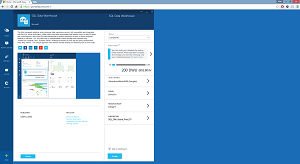Azure SQL Data Warehouse Leads New Microsoft Data Products
A new Azure SQL Data Warehouse preview offered as a counter to Amazon's Redshift headed several data-related announcements at the opening of the Microsoft Build conference today.
Also being announced were Azure Data Lake and "elastic databases" for Azure SQL Database, further demonstrating the company's focus on helping customers implement and support a "data culture" in which analytics are used for everyday business decisions.
"The data announcements are interesting because they show an evolution of the SQL Server technology towards a cloud-first approach," IDC analyst Al Hilwa told this site. "A lot of these capabilities like elastic query are geared for cloud approaches, but Microsoft will differentiate from Amazon by also offering them for on-premises deployment. Other capabilities like Data Lake, elastic databases and Data Warehouse are focused on larger data sets that are typically born in the cloud. The volumes of data supported here builds on Microsoft's persistent investments in datacenters."
Azure SQL Data Warehouse will be available as a preview in June, Microsoft announced during the Build opening keynote. It was designed to provide petabyte-scale data warehousing as a service that can elastically scale to suit business needs. In comparison, the Amazon Web Services Inc. (AWS) Redshift -- unveiled more than two years ago -- is described as "a fast, fully managed, petabyte-scale data warehouse solution that makes it simple and cost-effective to efficiently analyze all your data using your existing business intelligence tools."
 [Click on image for larger view.]
Azure SQL Data Warehouse (source: Microsoft)
[Click on image for larger view.]
Azure SQL Data Warehouse (source: Microsoft)
Microsoft pointed out what it said are numerous advantages that Azure SQL Data Warehouse provides over AWS Redshift, such as the ability to independently adjust compute and storage, as opposed to Redshift's fixed compute/storage ratio. Concerning elasticity, Microsoft described its new service as "the industry’s first enterprise-class cloud data warehouse as a service that can grow, shrink and pause in seconds," while it could take hours or days to resize a Redshift service. Azure SQL Data Warehouse also comes with a hybrid configuration option for hosting in the Azure cloud or on-premises -- as opposed to cloud-only for Redshift -- and offers pause/resume functionality and compatibility with true SQL queries, the company said. Redshift has no support for indexes, SQL UDFs, stored procedures or constraints, Microsoft said.
Enterprises can use the new offering in conjunction with other Microsoft data tools such as PowerBI, Azure Machine Learning, Azure HDInsight and Azure Data Factory.
Speaking of other data offerings, the Azure Data Lake repository for Big Data analytics project workloads provides one system for storing structured or unstructured data in native formats. It follows the trend -- disparaged by some analysts -- pioneered by companies such as Pivotal Software Inc. and its Business Data Lake. It can work with the Hadoop Distributed File System (HDFS) so it can be integrated with a range of other tools in the Hadoop/Big Data ecosystem, including Cloudera and Hortonworks Hadoop distributions and Microsoft's own Azure HDInsight and Azure Machine Learning.
For straight SQL-based analytics, Microsoft introduced the concept of elastic databases for Azure SQL Database, its cloud-based SQL Database-as-a-Service (DBaaS) offering. Azure SQL Database elastic databases reportedly provide one pool to help enterprises manage multiple databases and provision services as needed.
The elastic database pools let enterprises pay for all database usage at once and facilitate the running of centralized queries and reports across all data stores. The elastic databases support full-text search, column-level access rights and instant encryption of data. They "allow ISVs and software-as-a-service developers to pool capacity across thousands of databases, enabling them to benefit from efficient resource consumption and the best price and performance in the public cloud," Microsoft said in a news release.
Posted by David Ramel on 04/29/2015